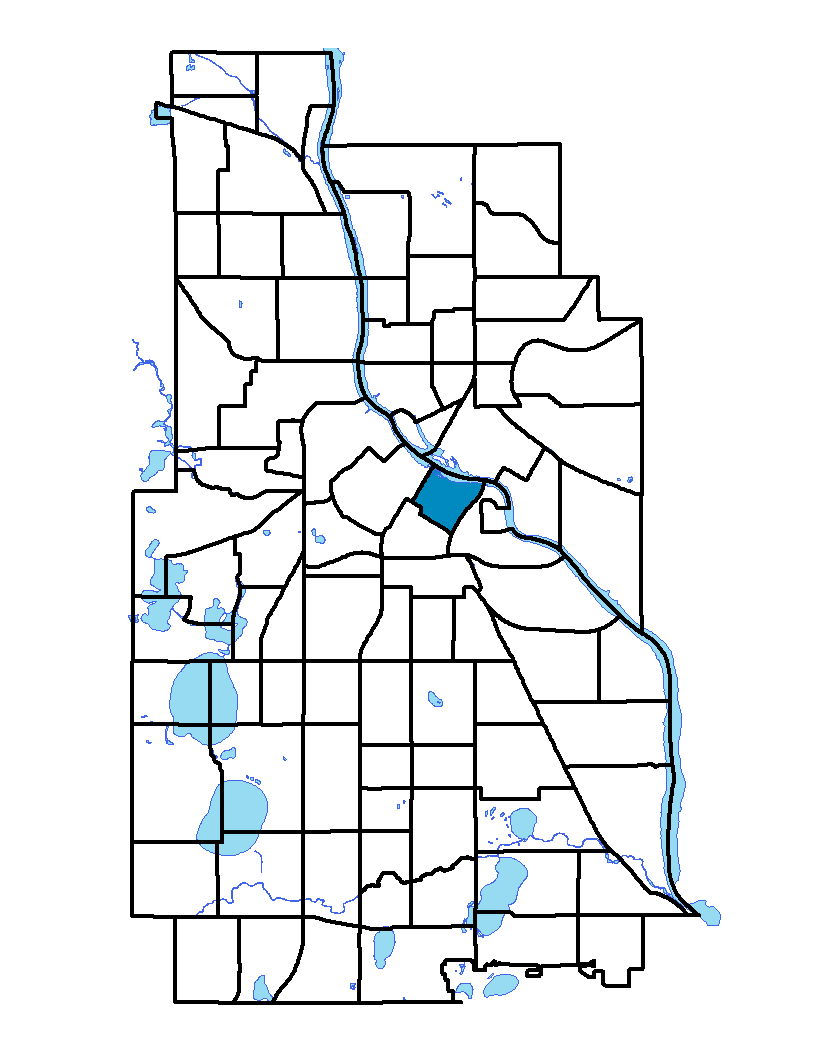Downtown East is located in the center of the city. The neighborhood is bound in the north by the Mississippi River, in the west by Portland Avenue South, in the east by Interstate 35W and in the south by Fifth Street South. It contains mainly recreational land including the Metrodome plus commercial, industrial and vacant land. Only a very small portion of this neighborhood is dedicated to residential housing, but housing is being built at record levels. Downtown East houses the Mill City Museum, with the new Guthrie Theater opening in the summer of 2006. Along the waterfront, the city has built a park themed on the history of Minneapolis incorporating mill ruins and featuring the Mill City Museum. The park extends beyond the neighborhood. Many of the old mills and factories have been converted into residential or commercial uses.
To learn more about the neighborhood association visit: www.thedmna.org
Indicator Details
| Indicators |
Primary Domain |
Indicator Value | Rank | Tier |
|---|---|---|---|---|
| Transit Accessibility | Transportation | 1395 | 3 | Top |
| Commute Mode Share | Transportation | 38.4% | 19 | Top |
| Household Transportation Costs | Transportation | 15.4% | 23 | Top |
| Pedestrian Connectivity | Transportation | 140.6 | 35 | Middle |
| Residential Mobility | Social Cohesion | 59.5% | 80 | Bottom |
| Voter Participation | Social Cohesion | 37.2% | 17 | Top |
| Walkability | Neighborhood Characteristics | 87 | 7 | Top |
| Offsite Alcohol Outlets | Neighborhood Characteristics | 9 | 72 | Bottom |
| Food Desert | Neighborhood Characteristics | -% | - | Data N/A |
| Tree Cover | Natural Areas | 27.9% | 50 | Middle |
| Access to Parks and Open Space | Natural Areas | 4.9% | 46 | Middle |
| Violent Crime | Health Systems and Public Safety | 106.1 | 77 | Bottom |
| Chronic School Absence | Health Systems and Public Safety | -% | - | Data N/A |
| Low Birth Weight | Health Systems and Public Safety | 11.4% | 67 | Bottom |
| Motor Vehicle Collisions | Health Systems and Public Safety | 23.2 | 71 | Bottom |
| Preventable Hospitalizations | Health Systems and Public Safety | 0 | 1 | Top |
| Vacancy Rates | Housing | 10.4% | 60 | Bottom |
| Age of Housing | Housing | 47.5% | 5 | Top |
| Blood Lead Levels in Children | Housing | 4.9% | 51 | Middle |
| Excessive Housing Cost Burden | Housing | 23.2% | 22 | Top |
| Public Assisted Households | Employment Opportunities | 12.9% | 34 | Middle |
| Employment Rate | Employment Opportunities | 61.7% | 66 | Bottom |
| Long-Term Unemployment | Employment Opportunities | 11.1% | 82 | Bottom |
| Travel Time to Work | Employment Opportunities | 20 minutes | 12 | Top |
| Residential Proximity to Traffic | Environmental Hazards | 19.4% | 56 | Middle |
| Proximity to Brownfield Sites | Environmental Hazards | 36.1% | 85 | Bottom |
| School Proximity to Traffic | Environmental Hazards | -% | - | Data N/A |
| Proximity to Superfund Sites | Environmental Hazards | 72.2% | 71 | Bottom |
| Toxic Releases from Facilities | Environmental Hazards | 0.0% | 1 | Top |
| Reading Proficiency | Educational Opportunities | -% | - | Data N/A |
| Adult Educational Attainment | Educational Opportunities | 84.5% | 59 | Bottom |
| High School Graduation Rate | Educational Opportunities | -% | - | Data N/A |
| School Readiness Scores | Educational Opportunities | -% | - | Data N/A |
| Preschool Enrollment | Educational Opportunities | -% | - | Data N/A |
| Business Retention | Economic Health | -15.2% | 87 | Bottom |
| Access to Mainstream Financial Services | Economic Health | 0.0% | 1 | Top |
| Local Business Vitality | Economic Health | 47.5% | 62 | Bottom |

